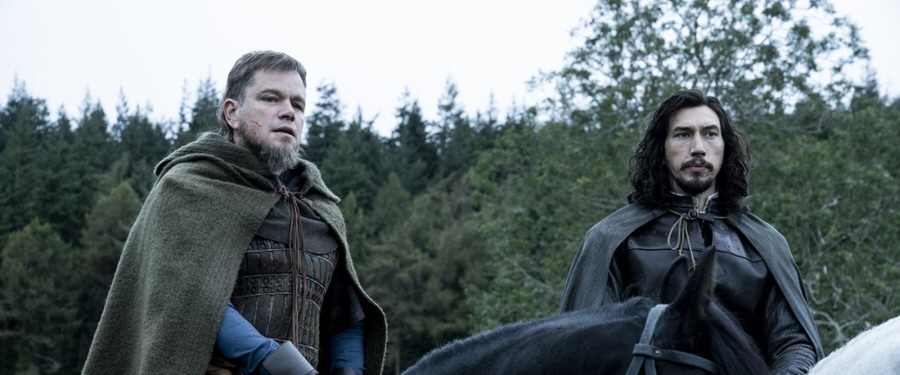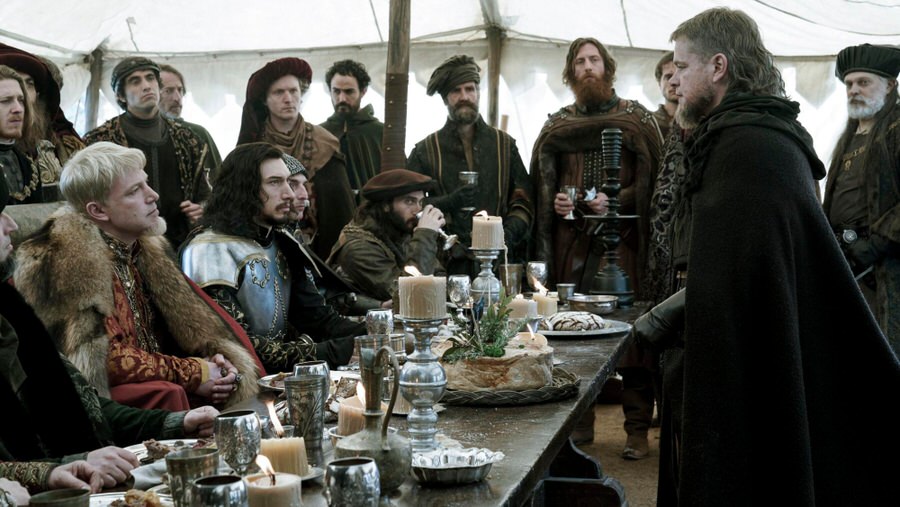The Last Duel
Directed by Ridley Scott (2021) ***
 Judicial duels (also known as trial by combat), while having their origins in Germanic law, became used throughout medieval Europe as a means of government sanctioned settlements of accusations and legal conflicts. The results often ended in death (how many less lawsuits there might be today if duels were still legally sanctioned). The last judicial duel held in France was fought by the knight Jean de Carrouges and the squire Jacques Le Gris — Carrouges’ wife, Marguerite, had accused Le Gris of raping her while Jean was away on business. Professor Eric Jager, a specialist in medieval literature, used this story as the basis of his 2004 book, The Last Duel: A True Story of Trial by Combat in Medieval France, the basis of director Ridley Scott’s most recent epic.
Judicial duels (also known as trial by combat), while having their origins in Germanic law, became used throughout medieval Europe as a means of government sanctioned settlements of accusations and legal conflicts. The results often ended in death (how many less lawsuits there might be today if duels were still legally sanctioned). The last judicial duel held in France was fought by the knight Jean de Carrouges and the squire Jacques Le Gris — Carrouges’ wife, Marguerite, had accused Le Gris of raping her while Jean was away on business. Professor Eric Jager, a specialist in medieval literature, used this story as the basis of his 2004 book, The Last Duel: A True Story of Trial by Combat in Medieval France, the basis of director Ridley Scott’s most recent epic.
Co-written by Nicole Holofcener (Orange Is the New Black), Ben Affleck and Matt Damon, The Last Duel uses a Rashomon-style template for its structure: the 14th century story is told three times, each from the perspective of three protagonists. All leads up to the duel itself, a bone-crushing display of savagery, singularly unlike the chivalrous duels portrayed in classic Hollywood films. The entire large-scale spectacle is in keeping with Scott’s past films (The Duellists, Gladiator, Exodus: Gods and Kings), but updated for #MeToo times, in ways bordering on preachiness.
Matt Damon plays the scar-faced, mullet-headed Jean, a fighter and farmer who, while loyal and steadfast, is contentious, vain and hard to like. During The Caroline War, Jean saves the life of Jacques Le Gris (Adam Driver, looking, as he also did in the historical The Silence, very much the part for the time period). Both swear allegiance to the King Charles VI-appointed Count Pierre d’Alençon (who it took a third of the film for me to recognize as Ben Affleck), a corrupt philanderer, who takes Jacques under his wing, appointing him as a money collector. Because of, among other extenuating circumstances, the Bubonic plague, workers and finances were diminished across the land. Extracting funds took harsh measures, and Jean, low of funds and under pressure, agrees to marry Marguerite de Thibouville (Jodie Comer, Killing Eve) for a large, promised dowry. The dowry included choice farming land which is subsequently taken by Pierre due to the Thibouville family’s debts, and given to Jacques. This sets up a simmering resentment that festers for years, as Jean feels (perhaps justifiably so) that he’s not respected by the Count or the squire.
Marguerite’s charge of rape (horribly shown — probably needlessly — twice) is disputed by the duplicitous Jacques, a serial womanizer and rapist whose life, surprisingly, looks especially bad from his own perspective (indicating that he has no remorse for his actions). Marguerite also deals with a snotty, contemptuous mother-in-law (Harriet Walter) and a friend who turns turncoat at the worst possible time (Tallulah Haddon). The virtuous Marguerite, already upon marriage a lover of literature as opposed to her husband, turns out to be smarter at farming, managing the estate while Jean is away. When Marguerite tells Jean of Jacques’ attack, he first accuses her of lying, and then considers the rape as a personal attack on him. Because there are no male heroes in sight (even the King, Charles VI, seems somewhat idiotic), and because the female protagonist is portrayed as without flaw, The Last Duel risks all to attempt to communicate a simple formula: the woman protagonist is smart and noble, while the male protagonists are malevolent, vain, dumb, of decidedly lesser character.
 Such would be the fate of The Last Duel hadn’t Scott and his collaborators filled the screen with such astonishing detail, with resolute determination to represent what life was like during this time and place, both good and ill. The skirmishes are blood and mud-stained nightmares fought at close quarters, with knives to the throat the most used method of stopping an invader covered in chain mail. The two and a half hour story is expansive, with gloriously large sets, meticulous detail in decor and costumes, fire-lit interiors and locations shot in the medieval castle of Berzé-le-Châtel in Burgundy and also in Ireland (shooting in 2020 had to be delayed for the duration of the summer due to the pandemic). All of the actors are fully committed to the project; Jodie Comer’s work is subtle and fierce and I predict a long, successful career for her. Damon is willing to degrade himself visually to play a sometimes pathetic character and Driver continues his arc of distinguishing himself as one of the finest actors of his generation. The actual duel is one for the ages. The brutal culmination of years of resentments, hatred and planning for revenge, the battle is a visceral, sweaty, shield-shattering struggle of epic proportions, with not only the men’s lives at stake; Jacques’ triumph would mean that his version of the story is “true”, resulting in Marguerite being hanged and then burned.
Such would be the fate of The Last Duel hadn’t Scott and his collaborators filled the screen with such astonishing detail, with resolute determination to represent what life was like during this time and place, both good and ill. The skirmishes are blood and mud-stained nightmares fought at close quarters, with knives to the throat the most used method of stopping an invader covered in chain mail. The two and a half hour story is expansive, with gloriously large sets, meticulous detail in decor and costumes, fire-lit interiors and locations shot in the medieval castle of Berzé-le-Châtel in Burgundy and also in Ireland (shooting in 2020 had to be delayed for the duration of the summer due to the pandemic). All of the actors are fully committed to the project; Jodie Comer’s work is subtle and fierce and I predict a long, successful career for her. Damon is willing to degrade himself visually to play a sometimes pathetic character and Driver continues his arc of distinguishing himself as one of the finest actors of his generation. The actual duel is one for the ages. The brutal culmination of years of resentments, hatred and planning for revenge, the battle is a visceral, sweaty, shield-shattering struggle of epic proportions, with not only the men’s lives at stake; Jacques’ triumph would mean that his version of the story is “true”, resulting in Marguerite being hanged and then burned.
One caveat: while The Last Duel‘s drama is propulsive enough to make long film feel shorter, it can be said to suffer from its three Rashomon-like entries not being as dissimilar from each other as they could have been.
Budgeted at $100 million, The Last Duel brought in only $30 million at the box office, the worst opening of any film in Ridley Scott’s career.
—Michael R. Neno, 2022 Mar 15